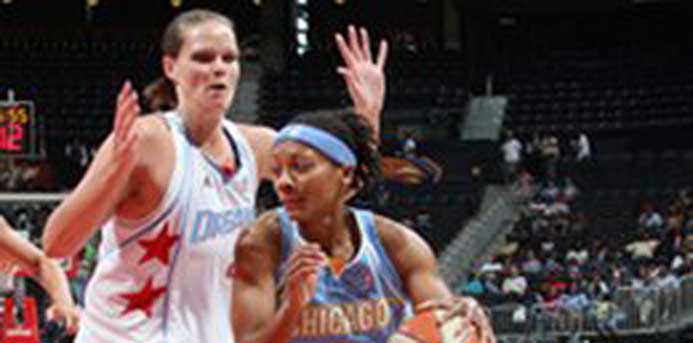Women’s sports have grown exponentially since 1972 when Title IX banned sex discrimination in federally funded education programs.
But Dominique Canty and her teammates on the Chicago Sky are still rare—women who continue to play a team sport after college and get paid to do so.
How many of us quit kicking or throwing a ball to a teammate when college ended, only to take up more individual fitness pursuits like yoga? Watching these women play together reminds us of the joy of a team sport.
“Being on a team, everybody is on the same page to win the game,” says Canty. And she loves that focus. “I get to do what I love to do, just like the guys.”
But the sport isn’t easy. Women who play for the WNBA play basketball in the summer—go to wnba.com/sky for the schedule—then most play overseas in the winter. The starting salaries in the WNBA average between $30 and $40K (versus $400 to $500K for the NBA). But in Europe, they can double their salary, so out of necessity, most women pack their bags for six months each year.
Canty has played in Turkey, Israel and Poland. “The fans are crazy! They love basketball and bring drums and horns,” she says with enthusiasm, but admits that being away from home for so long is a sacrifice.
Adam Fox, president and CEO of the Sky, is working to grow the sport and league so future players have the option of staying in the U.S. year-round.
“These women don’t get enough credit for their lifestyle and what they do,” he says. And in general, a lack of credit is part of the problem for women’s sports. He acknowledges that it’s a challenge to get people to check out a traditional sport played by non-traditional players. “But once they go to a game, people usually have a great time and come back,” says Fox. “It’s high-caliber basketball.”
The newest addition to the team is Wilmette native and Northwestern graduate Amy Jaeschke. She was selected by the Sky in the 2011 WNBA draft. But her career started much earlier, when she learned to play basketball through the Wilmette Park District in fourth grade.
“You make a lot of friendships playing with these girls,” she says. “It unites everyone when you’re working toward one common goal.”
And that’s something that Fox, who is raising two young girls, thinks more women should share with their daughters. “You can support women doing a lot of things, but here you have strong women in central, non-traditional roles.”
They’re not just shooting hoops. They’re working together to win a game they love. How many of us former soccer/softball/volleyball players can still say that? Maybe more of us should.

